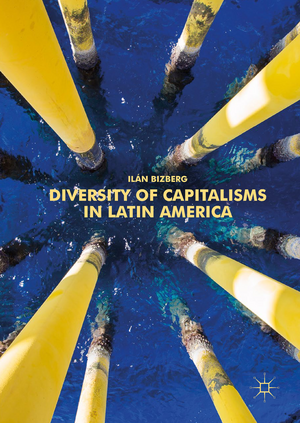Diversity of Capitalisms in Latin America
Autor Ilán Bizbergen Limba Engleză Hardback – 28 ian 2019
“One of the definite merits of this book is to cleverly mix a theoretical breakthrough with a meticulous historical and empirical account of the transformations of some key Latin American countries. First, it is at the frontier of a research agenda initiated back to the end of the 1970s, second it clearly distinguishes between an ideal-type approach and the complexity of any specific national configuration and its transformation in history. Furthermore, the author provides decisive arguments against a pure economic determinism too frequently supposed to govern institutions building and reforms. Last but not least, the book culminates by an impressive analysis of the crises that quite any Latin America society experiences at the end the 2010s.”
This book defends the idea that there are significant structural and institutional differences between the countries in Latin America. Building off the results of a four-year research project, Bizberg argues against the idea that in Latin America there is one single type of capitalism—a hierarchical one—that is entangled in a vicious cycle. Rather, there are clusters of countries that have had similar historical trajectories, analogous structures, or comparable reactions to changes to the world economy, but have not all followed the same mode of development. Just as analysts have found a variety of capitalisms in developed countries, it is possible to identify the emergence of different types of capitalism in Latin America since the 1980s debt crisis. These varieties of capitalism are defined according to categories—including the articulation to the world economy, the role of the State, the structure of the political system and the action of civil society—which give rise to distinct wage relations, comprising the industrial relations system and the welfare regime.
Preț: 647.92 lei
Preț vechi: 762.26 lei
-15% Nou
Puncte Express: 972
Preț estimativ în valută:
123.98€ • 135.09$ • 104.47£
123.98€ • 135.09$ • 104.47£
Carte tipărită la comandă
Livrare economică 23 aprilie-07 mai
Preluare comenzi: 021 569.72.76
Specificații
ISBN-13: 9783319955360
ISBN-10: 3319955365
Pagini: 276
Ilustrații: XXXVIII, 362 p. 49 illus., 47 illus. in color.
Dimensiuni: 148 x 210 x 24 mm
Greutate: 0.63 kg
Ediția:1st ed. 2019
Editura: Springer International Publishing
Colecția Palgrave Macmillan
Locul publicării:Cham, Switzerland
ISBN-10: 3319955365
Pagini: 276
Ilustrații: XXXVIII, 362 p. 49 illus., 47 illus. in color.
Dimensiuni: 148 x 210 x 24 mm
Greutate: 0.63 kg
Ediția:1st ed. 2019
Editura: Springer International Publishing
Colecția Palgrave Macmillan
Locul publicării:Cham, Switzerland
Cuprins
1. The Theoretical Perspective of this Book.- 2. Four Types of Capitalism in Latin America.- 3. The Accumulation Regime.- 4. The Mode of Integration to the World Economy.- 5. The Role of the State.- 6. The Dominant Social Coalition: Transformations and Present Configuration.- 7. State Structures and Political Systems.- 8. The Social Contract: The Wage Relation.- 9. Conclusions: Performance and Frailties of the Latin American Capitalisms.
Notă biografică
Ilan Bizberg is Professor and Researcher at El Colegio de México; associate member of the CADIS/EHESS, Paris, associate professor of the Internationales Graduiertenkolleg “Zwischen Räumen” of the Freie Universität Berlin, and member of the CEIM-UQAM, Canada.
Textul de pe ultima copertă
“One of the definite merits of this book is to cleverly mix a theoretical breakthrough with a meticulous historical and empirical account of the transformations of some key Latin American countries. First, it is at the frontier of a research agenda initiated back to the end of the 1970s, second it clearly distinguishes between an ideal-type approach and the complexity of any specific national configuration and its transformation in history. Furthermore, the author provides decisive arguments against a pure economic determinism too frequently supposed to govern institutions building and reforms. Last but not least, the book culminates by an impressive analysis of the crises that quite any Latin America society experiences at the end the 2010s.”
-Robert Boyer, Institut des Amériques, Paris, France.
This book defends the idea that there are significant structural and institutional differences between the countries in Latin America. Building off the results of a four-year research project, Bizberg argues against the idea that in Latin America there is one single type of capitalism—a hierarchical one—that is entangled in a vicious cycle. Rather, there are clusters of countries that have had similar historical trajectories, analogous structures, or comparable reactions to changes to the world economy, but have not all followed the same mode of development. Just as analysts have found a variety of capitalisms in developed countries, it is possible to identify the emergence of different types of capitalism in Latin America since the 1980s debt crisis. These varieties of capitalism are defined according to categories—including the articulation to the world economy, the role of the State, the structure of the political system and the action of civil society—which give rise to distinct wage relations, comprising the industrial relations system and the welfare regime.
Caracteristici
Rejects the idea that Latin American nations share a single form of capitalism Examines the factors upon which various Latin American economies are based Traces some aspects of the historical trajectories of Argentina, Brazil, Bolivia, Chile, Colombia, Peru, Mexico, and Ecuador Explores the character of the political systems and socio-political groups that drive economic decisions in Latin America
